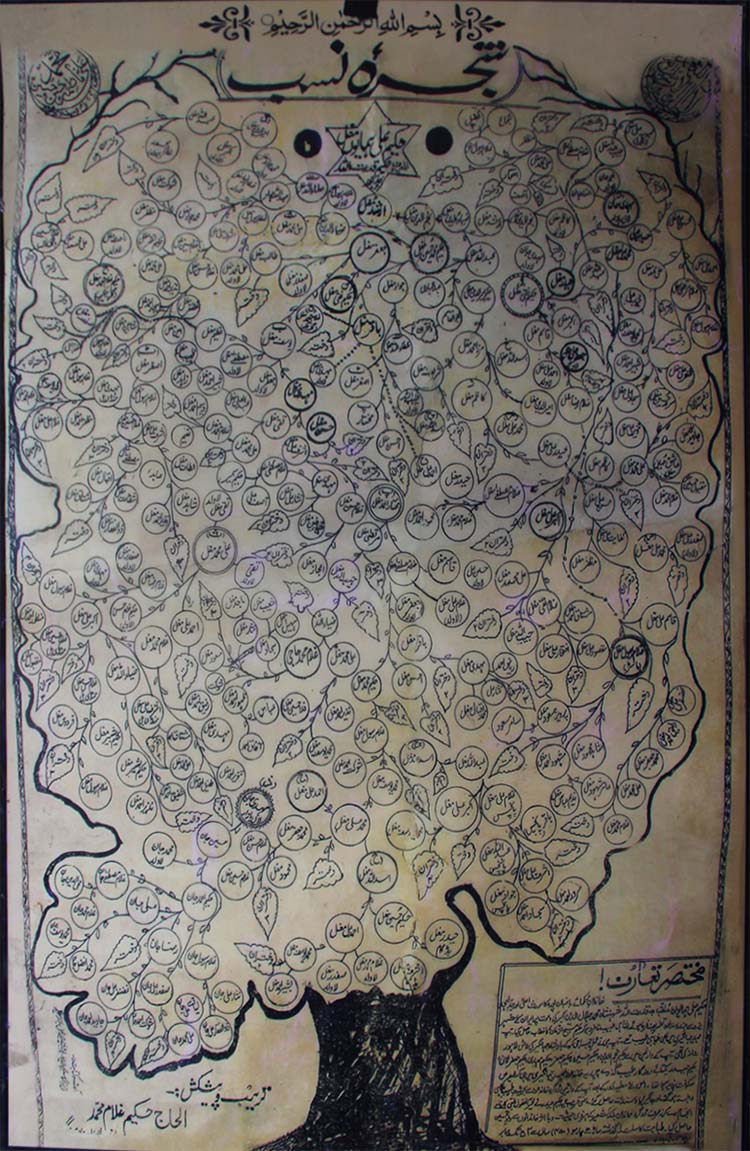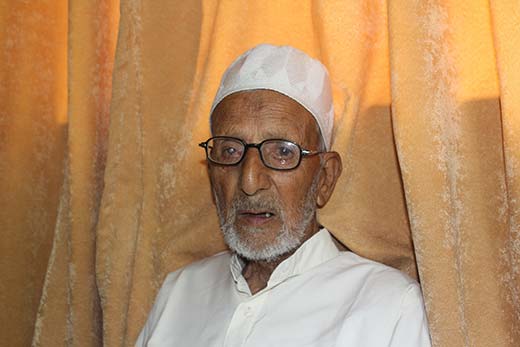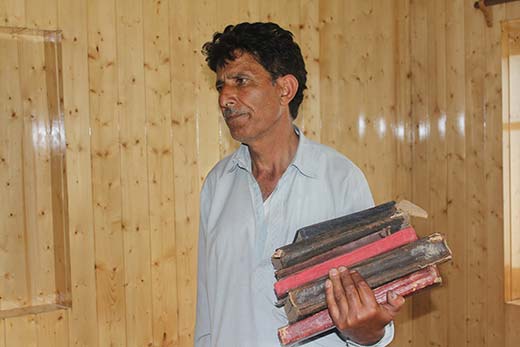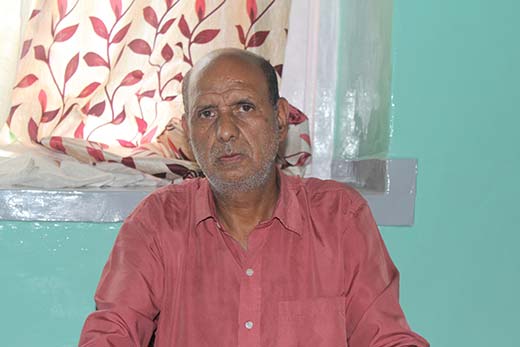Nestled in old lanes of Srinagar, Hakeems are struggling to survive in face of modernity. Syed Asma talks to some of the surviving practitioners of Unani medicine in Kashmir to know about their rich history and healing powers

Ask anybody about an exclusive Hakeem colony in Srinagar and you will be directed into the interiors of Baghwanpora in Lalbazar. Spread over 1200 kanals, Unani Sageer – as the place is known locally – once housed some of the most celebrated Hakims of Kashmir. They have been here for more than 400 years, since the times of Mughal Emperor Akbar.
As one walks through the narrow alleys of Unani Sageer, some 60-odd surviving households of Hakeem’s stand out.
And among those, the house of Hakeem Ghulam Mehdi –once a famous address for people seeking Unani help and medication – craves for attention now.
Forcing himself to retrieve from his falling memory 99-year-old Mehdi, a frail man who is visually impaired, tells that he has been practising hikmat for more than 50 years now. Barring the initial few years Mehdi has been a government hakeem throughout. “I have served at many places across Kashmir,” says Mehdi.
Most of the things seem to have faded with time but Mehdi says they are descendants of the hakeems from Iran.
Their story in India dates back to the Mughal reigns.
It is said that one of their ancestor Hakeem Ali Humayun, a Shia Muslim, was practising hikmat in Yazd, Iran. Humayun according to Mehdi was part of the royal team of Iranian hakeems, as he was known for his skills.
Around the same time, when Humayun was practising in Iran, the Mughal King Akbar was on a visit and fell ill.
As a king of the sub-continent, Akbar had to receive the best treatment. Reputed and renowned hakeems were put at his service; Humayun was one of them.
This story of Humayun treating famous Mughal King Akbar is part of every kid’s bedtime story in Unani Sageer’s of Kashmir.
Mehdi claims that the Mughal King Akbar was so impressed with Humayun’s knowledge and behaviour that he invited him to be in his [Akbar’s] royal team of hakeems. Since then he was a part of Akbar’s court.
But how did Hakeem Ali Humayun reach Kashmir?
“It was a gift,” believes Mehdi.
“Hakeem Humayun rose through the ranks and become close to Akbar. It was Akbar who gifted Hakeem Humayun 1200 kanal of land on the banks of Nigeen lake,” said Mehdi.
This is how the present-day Hakeem Mohallah or Unani Sageer got inhabited by the Hakeem community, claim residents.

“Till Sadiq Sahib’s times, the purchase of land in this area, near Nigeen Lake was banned. But as the population swelled many people came here and got settled,” says Mehdi’s nephew Hakeem Masood.
Mehdi and other Hakeems believe that it was Humayun who conducted the post-mortem on Emperor Jahangir’s body and stuffed it with the required medication in order to preserve it for burial in Lahore. Emperor Jahangir died near Sarai Saadabad in Kashmir on his way to Lahore in 1627.
Hakeem Masood, a B.Com graduate who is in his early fifties, is not a hakeem by profession instead is in the business of selling and purchasing Kashmiri handicrafts. “My generation did not consider it a respectable job. Though almost all of us regret the decision today but now we can’t do anything about it,” says Masood.

Of five siblings of Masood, Hakeem Sajad was interested in practising hikmat but he passed away due to renal cancer a few years back.
“He did not practise formally but had the know-how of the profession more than any of us in the family,” says Masood.
Having the know-how of Hakmath, didn’t Sajad try to cure himself of the disease?
“Perhaps he did, but as Hakeem Yusuf, one of our ancestors, in his book writes it is an incurable disease,” Masood answers.
Around 200 years back, Hakeem Yusuf, one of the community’s best-known faces, has talked about a disease called Sartaan, which in today’s times is called cancer, in his book.
Yusuf has written that the disease spreads silently and is usually detected when its cells enter the secondary stage (and become difficult to kill).
Yusuf mentioned in his book that in the coming times when medical science will be advanced, this disease would still have the potential to kill people. Even if, at some stage, it would seem that the disease is cured, the powerful cells of Sartaan (Cancer) can develop again after decades and kill the patient.
“This is exactly what happened to Sajad,” says Masood with a gloomy face. Sajad was Masood’s younger brother.
Although no one in the present generation practices hikmat but almost all have gone through the rich literature (about hikmat) available in their homes.

While confessing, Masood says, we may not practise it but we know and at times, when allopathic medicines do not work, we employ hikmat.
He has an incident to share; some years back he had a narrow escape with death when his scooter was hit by a fast-moving car. He was admitted to the hospital for more than a month.
Masood suffered from multiple fractures and had shooting pain in all the bones of his body. The doctor prescribed painkillers but that did not help. They (doctors) had convinced Masood’s family that he will have to live with a paralytic body. That was when an ancestral Unani prescription crossed his mind. “One of my ancestors in his books has written ‘hot water has so many benefits that I am surprised why it can’t make a dead man walk?’”
Masood employed the same therapy. “You won’t believe it. I could not stand on my own and four people took me to the bathroom to take the hot water therapy,” Masood remembers.
After Masood took a hot water shower for one and a half hours, he came out walking on his own.
There is another interesting case related to Hakeem Altaf who was cured of jaundice by employing Hikmat.
Hakeem Altaf, who is a papier-mâché artist, belongs to Masood’s generation. Like Masood Altaf too did not practice hikmat. But Altaf is perhaps the only person in Unani Sageer who still knows a bit of hikmat and is fit to prescribe Unani medicines. All others of his age have chosen not to take hikmat as a profession.
Almost a decade ago, Altaf was diagnosed with jaundice. “Knowing the side effects of the allopathic medicine I chose to go to my uncle Hakeem Ghulam Mehdi. Since then I too started studying Unani prescription and body anatomy from the rich literature that my ancestors have written,” says Altaf.
A large stock of invaluable books related to human anatomy, written by many famous Hakeems, was destroyed in a fire that destroyed Ghulam Mehdi’s clinic a few decades ago.
“Hundreds of valuable prescriptions and handwritten books were destroyed,” says Ghulam Mehdi.
After Altaf survived jaundice, he developed an interest in studying Unani medicine which paid him a few years ago.
He narrates his anecdote:
A few years ago he had a heart attack and his family rushed him to the nearby super speciality hospital. The doctors panicked and injected him with a high dose of some drugs, and in a few hours, he had a brain haemorrhage. All the medical examinations showed a bad state of his brain. The doctors told his brothers that the haemorrhage has resulted in several cuts in his brain and he might not survive.
Altaf continues, the doctors prescribed a few medicines which they told him to take till he is alive. “But I always hated allopathic medicines. Though for sometimes I was made to take them but fatigue and dizziness were its visible side-effect.”
He took the allopathic medicine for almost four months but says he was a dead man walking. “After four months I thought I should try my Unani prescriptions. I replaced my allopathic medication with Unani. Though it took time to heal but it has been five years since then and I am absolutely fine,” says Altaf.
Altaf was told steep roads, driving, and exertion may prove fatal for him but he says he lives a normal life.
“Since then I do prescribe Unani medicine if someone visits me and I do study a lot to improve my skills. If it saved me miraculously I believe it can help others as well,” believes Altaf.
But with Mehdi and Altaf the only surviving practitioners of Unani medicine, the future of Hakeem’s is in danger.
















Each and every information is wrong. Please contact me. Let us re-publish it. Contact me 9596505082.! Its worst research i have ever seen…